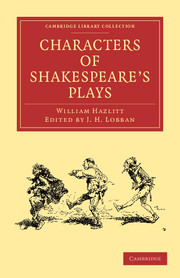Book contents
- Frontmatter
- Preface
- Contents
- Introduction
- Preface
- Cymbeline
- Macbeth
- Julius Cæsar
- Othello
- Timon of Athens
- Coriolanus
- Troilus and Cressida
- Antony and Cleopatra
- Hamlet
- The Tempest
- The Midsummer Night's Dream
- Romeo and Juliet
- Lear
- Richard II
- Henry IV
- Henry V
- Henry VI
- Richard III
- Henry VIII
- King John
- Twelfth Night; or, what you will
- The Two Gentlemen of Verona
- The Merchant of Venice
- The Winter's Tale
- All's Well That Ends Well
- Love's Labour's Lost
- Much Ado About Nothing
- As You Like It
- The Taming of the Shrew
- Measure for Measure
- The Merry Wives of Windsor
- The Comedy of Errors
- Doubtful plays of Shakespear
- Poems and Sonnets
- Notes
Hamlet
Published online by Cambridge University Press: 07 September 2010
- Frontmatter
- Preface
- Contents
- Introduction
- Preface
- Cymbeline
- Macbeth
- Julius Cæsar
- Othello
- Timon of Athens
- Coriolanus
- Troilus and Cressida
- Antony and Cleopatra
- Hamlet
- The Tempest
- The Midsummer Night's Dream
- Romeo and Juliet
- Lear
- Richard II
- Henry IV
- Henry V
- Henry VI
- Richard III
- Henry VIII
- King John
- Twelfth Night; or, what you will
- The Two Gentlemen of Verona
- The Merchant of Venice
- The Winter's Tale
- All's Well That Ends Well
- Love's Labour's Lost
- Much Ado About Nothing
- As You Like It
- The Taming of the Shrew
- Measure for Measure
- The Merry Wives of Windsor
- The Comedy of Errors
- Doubtful plays of Shakespear
- Poems and Sonnets
- Notes
Summary
This is that Hamlet the Dane, whom we read of in our youth, and whom we may be said almost to remember in our after-years; he who made that famous soliloquy on life, who gave the advice to the players, who thought “this goodly frame, the earth, a steril promontory, and this brave o'er-hanging firmament, the air, this majestical roof fretted with golden fire, a foul and pestilent congregation of vapours”; whom “man delighted not, nor woman neither”; he who talked with the grave-diggers, and moralised on Yorick's skull; the school-fellow of Rosencrantz and Guildenstern at Wittenberg; the friend of Horatio; the lover of Ophelia; he that was mad and sent to England; the slow avenger of his father's death; who lived at the court of Horwendillus five hundred years before we were born, but all whose thoughts we seem to know as well as we do our own, because we have read them in Shakespear.
Hamlet is a name; his speeches and sayings but the idle coinage of the poet's brain. What then, are they not real They are as real as our own thoughts. Their reality is in the reader's mind. It is we who are Hamlet. This play has a prophetic truth, which is above that of history.
- Type
- Chapter
- Information
- Characters of Shakespeare's Plays , pp. 84 - 91Publisher: Cambridge University PressPrint publication year: 2009First published in: 1908

